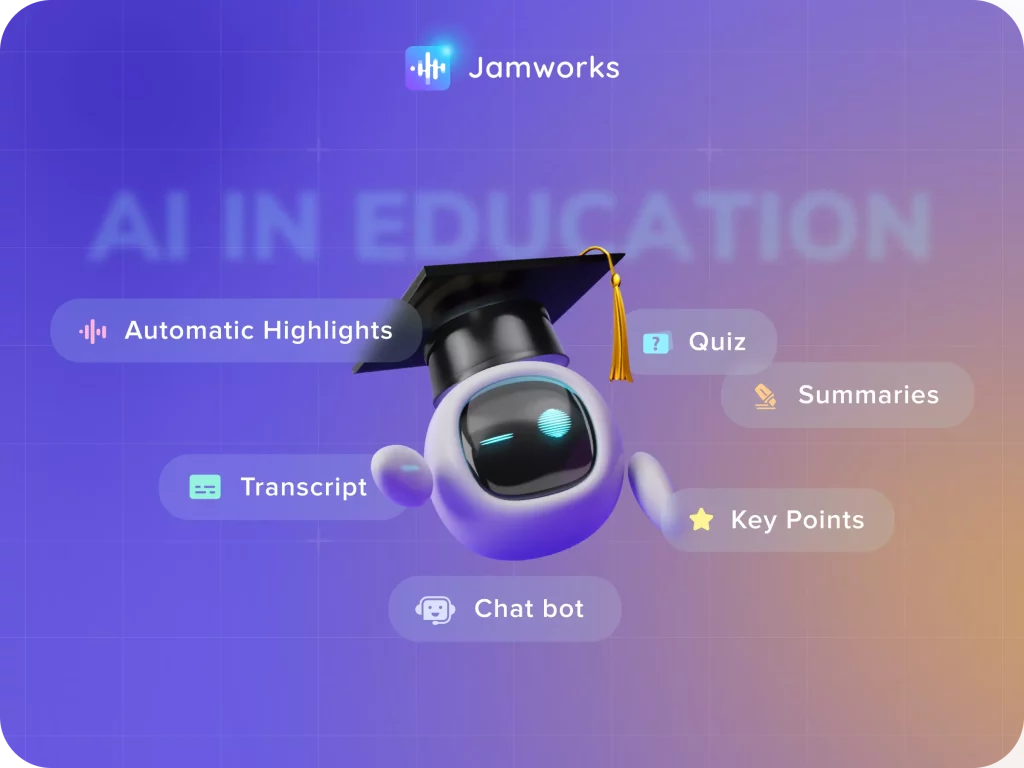AI tutors are becoming a popular tool among university students looking for learning support. According to a poll run by the Higher Education Policy Institute, 36% of students use generative AI tools to explain concepts, with 66% considering this to be an acceptable use of AI. If students are leveraging AI tools to enhance their learning experience, how can universities embrace this shift and ensure responsible AI use? In this blog, we’ll explore the benefits of AI tutors for personalised learning and how AI tools, like Jamworks, can provide a safe AI-powered learning experience.
Benefits of AI tutors for learning

AI tutors can encourage personalised, self-directed learning among students. Research from the UK and Hong Kong shows that many university students already use AI as a virtual tutor. While students express positive views on how AI supports their learning, they are aware of its limitations. For some, traditional tutoring is a readily accessible part of their education, but for others, AI may offer a more affordable and accessible alternative.
Personalised learning support with AI tutors
Learning is a unique process with each student having their strengths and challenges. Personalised feedback or learning support can make it easier for students to progress. AI tutors provide students with quick easy access to tailored learning support. Students can ask AI tools to explain concepts, provide feedback, or brainstorm ideas. It can generate quizzes, creative examples, and simple explanations to match students’ needs. This allows students to adapt their learning materials to their learning style.
Greater student engagement with self-directed learning
AI tutors can motivate students to engage in self-directed learning. Many students might not ask questions or seek support and additional feedback. AI provides an easy-to-access alternative, allowing students to pace their learning. By engaging with AI tutors, students can interact with real-time responses to develop their knowledge and feel supported with independent learning. A recent Harvard study on AI tutors found students were more engaged, motivated, and learning twice as much with an AI tutor.
This tutor was built and tailored specifically to the course material, ensuring students were given accurate lessons. They found that AI tutors could effectively support and engage students at all levels. For example, the AI tutor supported those learning new concepts and struggling to keep up but also challenged and engaged those with stronger background knowledge. This study highlights that AI tutors can enhance traditional learning and work as a tool for personalised learning that fosters great student engagement and motivation.
Accessible learning support for diverse needs
Personalised learning support can benefit all students, but might be essential for students with additional needs. Students with learning difficulties, mental health conditions, or those who identify as neurodivergent can benefit from AI tutors. From organising ideas to generating study materials, AI can provide assistance that helps all students to learn confidently. AI tutors can help students summarise and extract key points, help them organise their ideas, and gain feedback. Students can efficiently and easily get the answers and personalised support they need.
Saving time with AI tutors
Some may worry that AI will prevent students from learning with traditional teaching methods. However, AI tutors are meant to be an additional tool that enhances classroom or lecture-based learning. Both students and researchers view AI as a tool, not a replacement for traditional learning processes. The AI tutor in the Harvard study emphasised how AI can support educators and improve learning outcomes.
Students and educators can save time to focus on more critical aspects of learning, like critical thinking skills. If students feel more confident in their understanding of their learning material, they can engage in discussions and begin to deeply analyse ideas. Students can also focus on developing their critical writing skills, revising material, or memorisation, and feel more engaged to do so independently with an AI tutor.
Are AI tutors reliable?
Generative AI chatbot tools, like ChatGPT, can play the role of an AI tutor. However, these popular tools are known to hallucinate information or present incorrect facts. Students are mostly aware of the limitations of AI tools but don’t realise how often they can provide inaccurate information. If AI tutors are beneficial, how can universities bridge the gap to ensure students get a safe, reliable AI experience?
Some universities, like Harvard, have custom-built an AI tutor for their course that is accurate and well-structured. However, this requires time and expertise with AI, which isn’t realistic for many universities. Instead, tools like Jamworks can help universities and students use AI for learning, without the usual concerns. Jamworks is an AI-powered study tool that works directly with students’ lecture recordings.
AI tutors and note taking with Jamworks

30% of students hope their university would provide more AI tools. Jamworks is built for students and is provided by 80+ institutions across the world, including in the UK and the US. Students can capture, organise, and review their notes with powerful AI support using Jamworks. As AI tutors become popular among students, Jamworks can ensure students aren’t exposed to unreliable information, allowing them to stay on track with their course content. This allows universities to offer students a safe, reliable AI tool to enhance their learning and ensure accessible learning for all.
Personalised AI tutor with JamAI
JamAI is an AI-powered tutor chatbot that works with students’ recorded lecture content. Students can ask questions about their learning materials, anytime. JamAI offers students personalised learning support without the worry of unreliable and incorrect information. Students can confidently engage in self-learning and expand their understanding of lecture content. From explaining concepts to answering questions, JamAI empowers students to learn independently. This makes it easy for students to recap content without sifting through an entire lecture. If something doesn’t make sense, and they’re too anxious or shy to ask questions, JamAI can fill in the gaps.
Automated AI-powered note taking
Jamworks is designed to automate note taking with the power of AI. Students can focus on listening in lectures, knowing a structured set of notes will be ready for them at the end. Jamworks uses Automatic Highlights to find and break lecture recordings down into topics. Each topic can be reviewed as an audio snippet or a transcript extract. This structured and automated note taking process can save students time, and help many students overcome barriers to effective note taking.
Students can learn more effectively with a comprehensive, organised set of notes. Using AI, Jamworks offers a Key Points feature to summarise the main points and important information from lectures. Students can quickly and confidently review their notes, without clutter. This saves students time and allows them to focus on listening in class, preparing for assignments, and revising for exams.
AI flashcards for active recall
AI flashcards help students to review lecture content with ease. Jamworks generates personalised flashcards from lectures with detailed explanations. Flashcards are linked to the original lecture recording, making it easy to revisit the material if needed. Study techniques, like flashcards, are an effective form of active recall that boosts memorisation. Jamworks acts as a comprehensive study tool, helping students to capture, organise, and understand their learning material.
Should universities embrace AI tutors?
Educators’ concerns about the unethical use of AI and its overall reliability are valid. However, as AI becomes increasingly integrated into everyday tools like those from Microsoft, Google, and others, it’s important for universities to play an active role in navigating this shift. Students now have easy access to AI tools and are likely to use them. It seems that students are cautious with their AI use, especially where universities have given clear consequences for the misuse of AI tools.
Universities can go a step further to support, rather than discourage, the use of AI tools for learning. By proactively supporting students, universities can guide them in using AI responsibly with the right tools. They can continue to provide clear guidance on the ethical and acceptable use of AI, while also highlighting its limitations and potential pitfalls. This approach can help prevent a growing digital divide, where some students leverage AI to enhance their learning, while others are left behind.
Interested in providing lesson-specific AI Tutors to your students? Enquire about a free trial today.